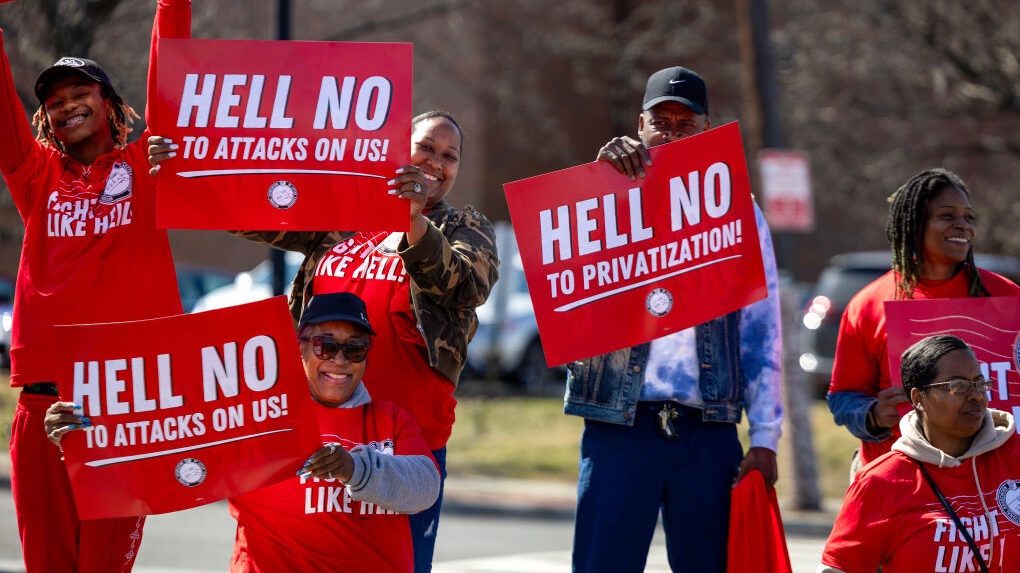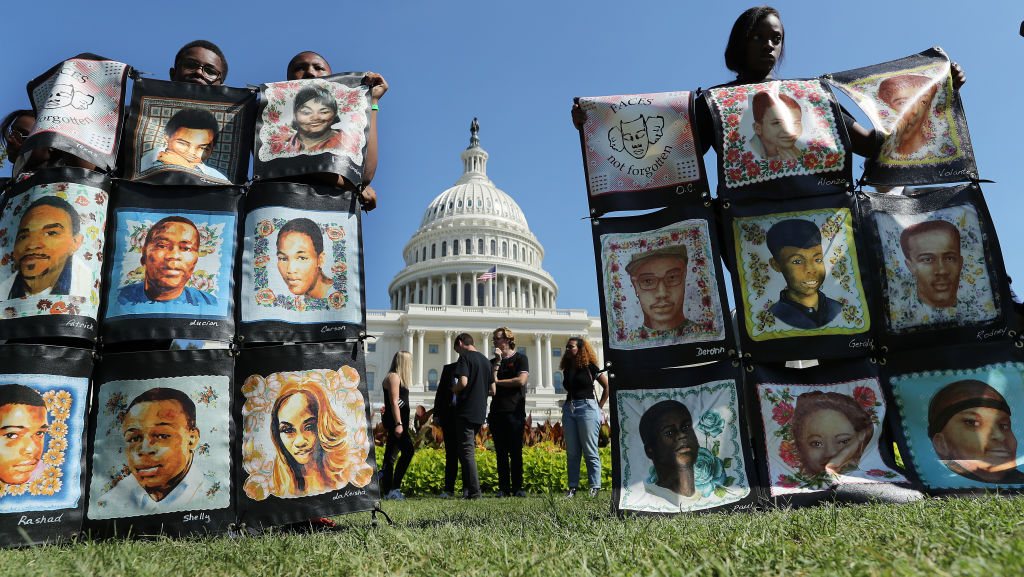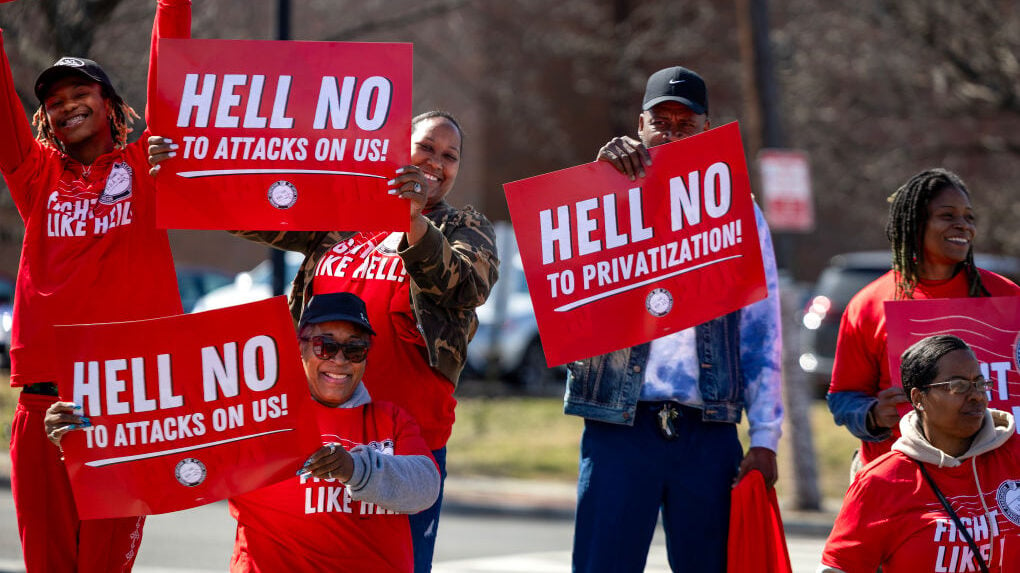Trump cuts to federal grants will make Black communities less safe and prosperous, experts warn

The second administration of President Donald Trump is being slammed for “putting lives on the line” and “destabilizing” already vulnerable communities.
Black communities and leaders who are working to keep them safe and prosperous are reeling from a stream of funding cuts issued by the Trump administration in recent days.
The cuts, part of President Donald Trump‘s aim to significantly reduce the size and scope of the federal government’s more than $6 trillion spending budget, have included the elimination of billions of dollars in grant funding programs created to reduce community gun violence in Black and Brown communities, and even develop the next generation of Black and Brown leaders working to end societal harms like homelessness, hunger, and even close educational gaps.
Over the past week, the Trump administration’s Department of Justice canceled hundreds of millions of dollars in grants contracted to organizations working in communities to end community violence, including gun violence and domestic violence. The Department of Education similarly canceled $1 billion in school mental health grants, which were used to deploy intervention experts into schools, hospitals and other hotspots to prevent violent outcomes in communities.
“Those programs are especially effective in Black communities,” said Aneesa McMillan, a spokesperson for GIFFORDS, the gun violence prevention organization founded by former Congresswoman Gabby Giffords, who survived an assassination attempt in 2011.
McMillan told theGrio that funding for community violence interventions, or CVI, paid professionals serving as peacemakers in targeted communities.
“These are people who were from the community [and] who knew the folks involved in a lot of the conflicts. That was critical, especially because that violence does not get the amount of coverage of, say, a school shooting,” she said.
Amber Goodwin, founder of Community Violence Legal Network, told theGrio that the Trump administration is “putting lives on the line” and “destabilizing our communities across the board.” She told theGrio, “Not just in the cities or the communities where these cuts happen, but the entire country is going to feel the effects of this.”
When announcing the grant cuts to community violence interventions, U.S. Attorney General Pam Bondi said it was part of the administration’s goal to cut wasteful spending. However, advocates point out that data shows that the bipartisan investments (funded by President Joe Biden’s 2022 Safer Communities Act) are actually working. In 2023 and 2024, gun homicide and gun violence rates fell.

“These decisions shouldn’t be about politics. It’s about the people who are actually impacted by gun violence on a daily and almost hourly basis … the cost of doing nothing to prevent gun violence far outweighs the cost of these programs,” said Goodwin, who also founded Community Justice Action Fund, a national gun violence prevention organization.
In addition to grants targeting violence and mental health, the government’s only agency focused on community service and volunteerism, AmeriCorps, saw 90% of its workforce funding slashed by Trump’s Department of Government Efficiency, led by billionaire Elon Musk. It’s already resulted in a federal lawsuit filed by a coalition of dozens of states and Washington, D.C.
The funding included grants awarded to longtime nonprofits like Public Allies, which trains and develops community youth leaders through apprenticeships to eventually work to address socioeconomic challenges–from disaster relief to environmental justice–impacting communities, particularly Black and Brown.
“When we have the clawback of funding to support our schools and communities that have the level of disinvestment in public education systems, particularly in neighborhoods and communities that have the least resources available, when we see the erosion of investment in things like housing and the development of new affordable housing, all of those things disproportionately impact us,” said Jenise Terrell, CEO of Public Allies.
Terrell explained to theGrio that the organization’s 10-month apprentice program through AmeriCorps (which existed for more than 30 years) not only trained young apprentices to do important, skillful community work and gave them a sense of purpose, but also a livelihood that has now been unexpectedly cut off.
“These are young people who, in many cases, are making less than $15 an hour, sometimes far less than that, who are literally surviving and thriving on paycheck to paycheck, just so that they can give their time and service,” said Terrell, who is an alum of the decades-old program.
Despite losing their community jobs, the young leaders are most concerned about the members of the community who will no longer benefit from their work and engagement.
“They still come to the table concerned about the communities…they want to know who’s going to be looking out for the young people in the after school program [for example],” said Terrell.
The Trump administration has also simultaneously associated many of its spending cuts to being related to diversity, equity and inclusion, or DEI, which President Trump has made a major feature of his budget and policy framework. Rather than focusing on diversity or equity, the Trump administration has called for a “merit-based” approach, particularly in hiring and contract procurement.

“Our take on merit is a little different than the current administration’s take,” said Terrell. “We believe that merit is, in addition to being defined by what you have achieved, is also inclusive of the experiences that you bring to the table. Experiences that provide insight that is often missing from the solutions.”
Despite the White House’s posture, advocates are still hoping that the administration can be persuaded into reversing course on their grant cuts. Some are actively engaging members of Congress, from both political parties, on the issue.
Congress is also entering intense negotiations on Capitol Hill as they work to finalize the budget for fiscal year 2026. Trump’s budget proposal calls for $163 billion in cuts from his $1.7 trillion discretionary budget on top of the billions of dollars that DOGE has already cut or frozen in the name of waste and fraud.
U.S. Rep. Yvette Clarke, chair of the Congressional Black Caucus, called Trump’s new budget “reckless” and argued he would rather make vital cuts to important federal agencies than work to “improve the economy, lower the cost of living, and make everyday necessities more affordable.”
“This budget scheme imposes economic hardship on everyday Americans, makes our country less safe, and our communities more vulnerable,” said Clarke. “We, the members of the CBC will not be a party to the destruction of our communities and the people we’ve been elected to represent.”

